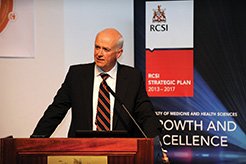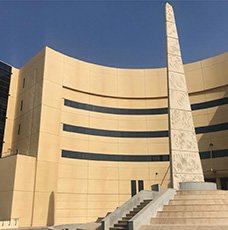In December, the Education Minister Joe McHugh tweeted a picture from his office with the message, ‘Sign-off. Putting pen to paper on university status for @RCSI_Irl after a 235-year history.”
It was a signature moment for RCSI, which could finally call itself a university in Ireland after years of lobbying. It had met the criteria under a new legal process.
The huge contribution of RCSI to healthcare education, training and research is beyond question. Many would have regarded it as a university ‘in all but name’.
However, difficult issues have arisen for RCSI during this process — around its controversial presence in Bahrain and the make-up of its governing body, which comprises 21 surgeons under an historic legal charter.
More broadly, documents obtained from the Department of Education under Freedom of Information (FoI) law reveal that the Department provided opportunities to an RCSI adviser to make suggested amendments to items including draft ministerial speaking points pertaining to RCSI.
On 5 December, the Minister of State for higher education, Mary Mitchell O’Connor, repeated verbatim lines from an RCSI-submitted briefing note on RCSI Bahrain when presenting her own position at the Joint Oireachtas Committee on Education and Skills.

In regard to allegations that clinical training sites used by RCSI Bahrain were connected to torture and discriminatory conduct in the provision of healthcare, Minister Mitchell O’Connor said: “There is no evidence to back up this assertion. The RCSI medical programme has been validated by the Irish Medical Council following an inspection to Bahrain.”
Her comments mirrored the wording of an RCSI briefing document, which stated: “There is no evidence to back up this assertion. The RCSI medical programme has been validated by the Irish Medical Council following an inspection to Bahrain.”
Protected title
The title ‘university’ is protected under the Universities Act, 1997, which provides a legal and regulatory framework for universities that receive their primary funding from the Exchequer (unlike RCSI).
In 2015, RCSI gained permission to describe itself as a university outside the State under the Education (Miscellaneous Provisions) Act 2015.
However, the College informed the Department of Education it only availed of the provision in limited circumstances. It expressed concern about reputational risks associated with explaining why an entity could describe itself as a university abroad, but not in the State.
Criticism along these lines was voiced in parliamentary debates on the legislation.
Speaking in the Seanad in November 2014, Senator Averil Power said the proposed law would put in place “an extraordinary new procedure for the benefit of the Royal College of Surgeons in Ireland, whereby that institution, which is not entitled to call itself a university within the State because it does not satisfy the relevant criteria, may market itself abroad as a university.”
She added that (the then) Dublin Institute of Technology and Waterford Institute of Technology, for example, provided qualifications on a par if not better than many UK institutions that called themselves universities.
“It is unacceptable to facilitate one institution in this State at the expense of others and without addressing the broader issues of internationalisation and ensuring all our third-level institutions can compete abroad and attract their fair share of foreign students.”
According to the then Minister for Education Jan O’Sullivan, the process would be open to any institution making awards to doctorate level under the Irish quality framework (RCSI is the only institution that has met the required criteria and availed of this benefit).
In 2018, the College was invited by the Department to submit a benchmarking analysis against key criteria for universities and outline evidence of future risks if this status was not achieved.
The Department found a “not unpersuasive case” that RCSI was strongly aligned with the universities established under the Universities Act. It also noted RCSI’s assertion that lack of university status negatively impacted its capacity to further strengthen its international profile.
Mr Don Thornhill, employed by RCSI as an adviser, was strongly involved in the College’s lobbying efforts. He was the Department of Education’s most senior civil servant during the 1990s and Chair of the Higher Education Authority (HEA) until 2005.
During 2019, Mr Thornhill and senior Department officials kept in regular contact on the issue, according to documents released to the Medical Independent (MI) under FoI law.
It was a complex process. On 7 February 2019, an amendment was proposed by a number of senators that there would be no legal barrier to RCSI describing itself as a university.
But the office of the Attorney General advised that the amendment was not legally robust, heard the Seanad.
Three days earlier, information on these legal issues and draft ministerial speaking notes were shared with Mr Thornhill by the Department’s Head of Higher Education and Further Education and Training Policy, Mr William Beausang.
Some of Mr Thornhill’s suggested additions to the draft ministerial speaking notes were then repeated by Minister Mitchell O’Connor in the Seanad.
In exact repetition of lines suggested by Mr Thornhill (although in keeping with the tone of her overall remarks), the Minister said the RCSI was “a statutory body and a statutory degree-awarding institution and has established an outstanding reputation internationally and in Ireland… for the quality of the education and training it provides, as well as excellence in research and service to society”.
The new amendment in draft form was also provided to Mr Thornhill. Then, on 19 February, a Department official informed Mr Thornhill “we have reviewed and revised the proposed amendment accordingly in light of RCSI’s most recent comments and suggestions”.
Mr Thornhill responded that RCSI was grateful for the “considered responses to our feedback. I think we would be happy if you went to Government with this text.”
On 28 March, Mr Beausang sent Mr Thornhill “a work in progress draft of the relevant amendment for report stage. I’m giving you early sight of this in case there is any significant issue that we may not have a line of sight on that could otherwise give rise to difficulty at a later stage.” The document was “strictly confidential to you and any of your colleagues who are working on this issue”.
A Department spokesperson told MI: “In light of cross-party support in the Seanad for an amendment… to grant the university title to RCSI, the Minister for Higher Education agreed to make an amendment to the Bill.
“The provision included in the Bill, therefore, had a specific focus on this issue. Consistent with good practice in developing legislative proposals, RCSI — the only higher-education institution to which the provision was potentially directly relevant at this time — was consulted to ensure there were no unintended consequences from the proposed legislative approach. No substantive policy change was made to the draft provision on the basis of this consultation process.”
Prospectus assessment
A new university recognition process was established under the Qualifications and Quality Assurance (Education and Training) Amendment Act 2019.
It allows an education provider to apply to the Minister for Education for university status in the State, where its primary income is not derived from the Exchequer. An order must be approved by resolution in the Oireachtas
There are a number of requirements, such as that the education provider must award qualifications to doctoral degree level; have coherent and effective governance structures; be financially viable; and promote critical and free enquiry, intellectual discourse and public debate within the education provider and wider society. There are also requirements in regard to staff qualifications and research activity.
As part of assessing RCSI’s application, the HEA commissioned Prospectus Management Consultants to evaluate the College against legal requirements.
This assessment was mostly positive, but identified some issues for RCSI.
The Prospectus consultants noted that the composition of RCSI’s governing body (the 21-member Council) was dictated by Charter, which prescribes that it is elected from the College Fellows.
Whilst expertise at Council had been broadened by the appointment of two lay personnel, they were not full members and had no decision-making authority.
In addition, there was no requirement for any break between terms on Council and no constraint on the number of consecutive terms, assuming a member continued to be re-elected by Fellows.
“This is somewhat at odds with good governance standards, where some restrictions regarding tenure typically apply”, stated the consultants, who cited the new charities code.
However, they also acknowledged RCSI’s point that prolonged tenure was not a significant issue, given the demands of the role.
On the stipulation that education providers respect the diversity of values, beliefs and traditions in Irish society, the Prospectus consultants stated: “The main challenge for RCSI is at a governance rather than operational level due to the requirement for elected members of the surgical profession itself needing to evolve towards a more representative gender and societal balance.
“RCSI is aware of the challenge and is active in addressing them. Four of the 21 surgeon members of Council are women. The College has greater discretion to ensure diversity in the composition of the Medical and Health Sciences Board which oversees all matters relating to medical and health sciences education to degree level and in the composition of the Surgery and Postgraduate Faculties Board and has sought so to do.”
The Prospectus consultants concluded that RCSI satisfactorily met the required stipulations on governance, finances, diversity and academic freedom. The HEA also engaged Deloitte to assess RCSI against conditions relating to student composition and staff qualifications and came to a positive conclusion. The Department sought further feedback from Quality and Qualifications Ireland, which did not identify any issues needing further scrutiny.
The Minister for Education did not appoint an expert advisory panel, as is mandatory for applications under the Technological Universities Act 2018, but which is discretionary under the university authorisation order process.
In November, Minister McHugh wrote to RCSI CEO Prof Cathal Kelly stating his intention to make a university authorisation order in respect of RCSI. “An tÚdarás [the HEA] did note in providing their views to me that the RCSI Council would, as the body ultimately responsible for institutional governance, benefit from student voice and representation and recommended this be taken into consideration should the RCSI Charter be reviewed at any future stage,” wrote Minister McHugh.

“You may also wish to consider this view in the broader context of ensuring that RCSI retains a strong student voice and representation more generally,” that further strengthens institutional governance and performance going forward.
Prof Kelly noted “the recommendation with regard to student voice and representation, which we will certainly give due consideration”.
Bahrain
On 5 December, Minister Mitchell O’Connor presented the draft order to the Oireachtas education committee. Most members were supportive of RCSI attaining university status.
Deputy Donnchadh Ó Laoghaire said his party (Sinn Féin) did not support the order because of the College’s “failure to tackle the human rights abuse suffered by their own former students in Bahrain”.

In 2003, RCSI established a multi-million euro campus in Bahrain. In 2011, following popular protests against the country’s ruling Al Khalifa family, the Bahraini authorities embarked on a brutal crackdown. This included “systematic and targeted attacks against medical personnel, as a result of their efforts to provide unbiased care for wounded protestors”, according to Physicians for Human Rights. These matters arose in sites used by RCSI Bahrain for clinical training.
Concerns remain that clinical training sites used by RCSI Bahrain enforce breaches of medical neutrality.
A November 2018 report from the UN Human Rights Committee stated its concern at “reports that demonstrators injured during demonstrations were questioned in medical facilities about their participation in demonstrations and denied medical assistance”.
In addition, it is alleged that clinical sites practice discrimination against healthcare workers from the country’s Shia Muslim majority.
Speaking to MI in 2016, Prof Tom Collins, who served as President of RCSI Bahrain from 2011 to 2013, recalled a meeting with a group of RCSI Bahrain nursing graduates who had been due to take up employment in the new King Hamad Hospital.
“As I recall, at least 20 or so of those who expected to get that employment were refused it on, I quote, ‘security grounds,’” said Prof Collins. “They were all Shia… I raised the issue at the highest level in Bahrain, of the fact that they had not been able to secure employment. But ultimately there was very little I could do.”
In 2013, when authorities blocked the holding of a medical ethics conference organised by RCSI Bahrain and Médecins Sans Frontières, Prof Collins resigned from his post.
In 2014, the Irish Medical Council accredited the medical degree programme at RCSI Bahrain for five years; a re-accreditation visit is imminent.
In May 2019, in an email to senior Department officials, Mr Thornhill referred to remarks about RCSI Bahrain by Sinn Féin Senator Paul Gavan in the Seanad the previous February. Mr Thornhill advised “it might be helpful to have a short briefing note on hand for reference if needed. I attach a note for your consideration and use as appropriate.”
This briefing note included reference to “critics” of RCSI’s involvement in Bahrain. These were “an Irish Dublin-based hospital medical consultant, who had worked with and supervised Bahraini doctors (including postgraduate Fellows of the College), who were jailed by the [Bahrain] Government” — a reference to Consultant Orthopaedic Surgeon Prof Damian McCormack; Front Line Defenders; and “a self-described lawyers group, Ceartas, about which there is almost no information”.
In 2016, Ceartas was subsumed into the Global Legal Action Network (GLAN), which has a website (www.glanlaw.org) and social media channels.
According to the College briefing note, RCSI’s leadership had “stressed that it is unacceptable to punish doctors or nurses for treating patients, irrespective of their background”. It had done so in letters to The Irish Times in 2011, a presentation to the Joint Oireachtas Committee on Foreign Affairs in 2012, and in several meetings with senior Bahraini officials in 2011 and subsequently.
The College believed that its commitment to students of all backgrounds and to the “highest ethical standards” in medicine would contribute to “just outcomes and community reconciliation”.
RCSI continued to pay “careful attention” to the education and safety of students and staff in Bahrain.
On “collaboration with hospitals in the violation of human rights”, the RCSI briefing note stated: “There is no evidence to back up this assertion. The RCSI medical programme has been validated by the Irish Medical Council following an inspection visit to Bahrain.”
These lines were repeated by Minister Mitchell O’Connor at the Oireachtas committee on 5 December, where she stated that RCSI had informed her about its Bahrain campus and quoted from the briefing note.
In a clearer enunciation of her own views, she continued: “I have heard what was said today. It was alleged that the hospitals in Bahrain, where RCSI Bahrain medical and nursing students have their clinical training, were connected to torture and discriminatory conduct in the provision of healthcare.
“There is no evidence to back up this assertion. The RCSI medical programme has been validated by the Irish Medical Council following an inspection to Bahrain.”
A Department spokesperson told MI the Minister’s comments were in response to specific allegations concerning RCSI’s medical programme in Bahrain made at the Committee meeting.
“The Minister made clear in her contribution to the Joint Committee that the views of the RCSI had been provided to the Department on this issue. This was fully appropriate and consistent with the principles of natural justice in light of the nature of the allegations being made regarding the RCSI’s medical training programme at its Bahrain campus.”
They added “as is clear from the Minister’s response to this issue at the Joint Committee, her assessment was based on the Irish Medical Council’s 2014 accreditation report for the RCSI medical education programme in Bahrain, the main findings of which were outlined by the Minister at the Joint Committee meeting”.












Leave a Reply
You must be logged in to post a comment.